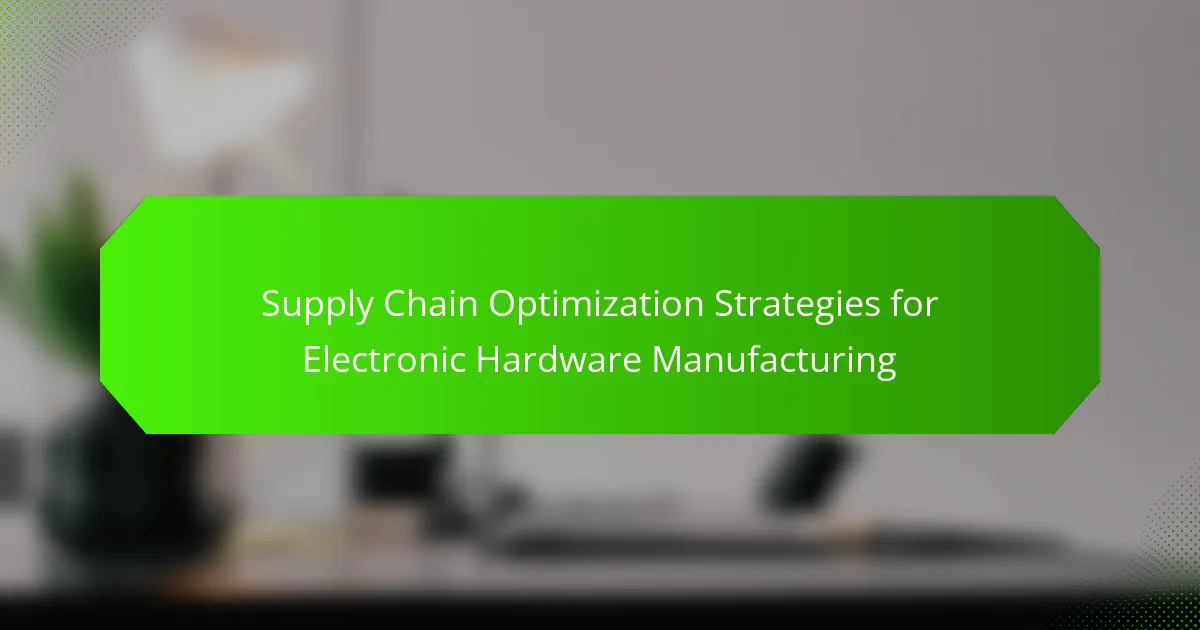Supplier Relationship Management (SRM) in electronic hardware manufacturing focuses on optimizing the interactions between manufacturers and their suppliers. Key practices include establishing clear communication to ensure mutual understanding, fostering collaboration to drive innovation and enhance product quality, and conducting regular performance evaluations to identify improvement areas. Additionally, implementing risk management strategies is vital for mitigating potential supply chain disruptions, while developing long-term partnerships with suppliers can enhance reliability and reduce costs. This article outlines effective strategies for overcoming common challenges in SRM, such as communication issues and trust deficits, ultimately contributing to a more efficient supply chain.

What are Best Practices for Supplier Relationship Management in Electronic Hardware Manufacturing?
Best practices for Supplier Relationship Management in electronic hardware manufacturing include establishing clear communication, fostering collaboration, and conducting regular performance evaluations. Clear communication ensures that both parties understand expectations and requirements. Fostering collaboration can lead to innovation and improved product quality. Regular performance evaluations help identify areas for improvement and strengthen the relationship. Additionally, implementing risk management strategies is crucial for addressing potential supply chain disruptions. Developing long-term partnerships with suppliers can enhance reliability and reduce costs. These practices contribute to a more efficient and effective supply chain in the electronic hardware sector.
How do effective supplier relationships impact electronic hardware manufacturing?
Effective supplier relationships significantly enhance electronic hardware manufacturing. Strong partnerships lead to improved communication, resulting in faster response times to market changes. This agility allows manufacturers to adapt quickly to technological advancements and customer demands. Additionally, reliable suppliers contribute to consistent quality and timely delivery of components. Research indicates that companies with robust supplier relationships experience up to 20% lower production costs. These relationships also foster innovation through collaborative efforts, enabling joint development of new technologies. Overall, effective supplier relationships are essential for optimizing efficiency and competitiveness in electronic hardware manufacturing.
What key factors contribute to successful supplier relationships?
Key factors that contribute to successful supplier relationships include effective communication, trust, and collaboration. Effective communication ensures clarity in expectations and reduces misunderstandings. Trust fosters a reliable partnership and encourages open dialogue. Collaboration leads to joint problem-solving and innovation. Additionally, mutual respect and shared goals strengthen the relationship. Regular performance evaluations help maintain accountability and transparency. According to a study by the Institute for Supply Management, strong supplier relationships can lead to improved performance and cost savings.
How can communication enhance supplier relationship management?
Effective communication enhances supplier relationship management by fostering transparency and trust. Clear communication ensures that expectations are understood by both parties. This reduces misunderstandings and aligns goals. Regular updates and feedback loops keep suppliers informed about changes and performance metrics. According to a study by the Institute for Supply Management, companies that prioritize communication see a 20% increase in supplier satisfaction. Enhanced communication also facilitates collaboration, leading to innovative solutions and improved efficiency. Overall, strong communication practices result in long-term partnerships and better supply chain performance.
Why is supplier relationship management crucial in electronic hardware manufacturing?
Supplier relationship management is crucial in electronic hardware manufacturing because it enhances collaboration and efficiency. Strong supplier relationships lead to improved communication and faster problem resolution. This is essential in an industry where time-to-market is critical. Effective management also ensures quality control and consistency in materials. According to a study by the Institute for Supply Management, companies with strong supplier relationships experience 25% lower costs. Furthermore, it fosters innovation through collaborative efforts on product development. This is vital in a rapidly evolving technological landscape. Overall, effective supplier relationship management reduces risks and strengthens the supply chain.
What risks are associated with poor supplier relationship management?
Poor supplier relationship management poses several risks. These risks include supply chain disruptions, leading to production delays. Inconsistent quality of materials can result from weak supplier ties. Financial instability of suppliers may arise from lack of communication. Increased costs can occur due to sudden price changes. Poor collaboration can hinder innovation and responsiveness. Legal issues may emerge from contract misunderstandings. Reputation damage can result from subpar supplier performance. According to a study by Deloitte, 79% of companies experience supply chain disruptions due to poor supplier relationships.
How does supplier relationship management affect product quality?
Supplier relationship management directly impacts product quality. Effective management fosters collaboration and communication between suppliers and manufacturers. This collaboration leads to better understanding of quality standards and expectations. Enhanced communication reduces misunderstandings that can compromise product integrity. Furthermore, strong relationships encourage suppliers to invest in quality improvements. Research shows that companies with robust supplier relationships report fewer defects and higher customer satisfaction. For instance, a study by the Institute for Supply Management found that 70% of organizations with strong supplier partnerships achieved better product quality. Thus, effective supplier relationship management is crucial for maintaining high product quality in electronic hardware manufacturing.

What strategies can be employed for effective supplier relationship management?
Effective supplier relationship management can be achieved through several strategies. First, establishing clear communication is essential. Regular updates and open dialogue help build trust. Second, performance metrics should be defined and monitored. This ensures accountability and transparency in supplier operations. Third, fostering collaboration can lead to innovation. Joint development projects can enhance product quality and reduce costs. Fourth, implementing a supplier evaluation process is crucial. This allows for the assessment of supplier capabilities and alignment with business goals. Fifth, investing in long-term partnerships can yield mutual benefits. Long-term relationships often lead to better pricing and reliability. Lastly, providing feedback is important. Constructive feedback helps suppliers improve their services and products. These strategies have been shown to enhance supplier performance and overall business success in electronic hardware manufacturing.
How can organizations assess their suppliers effectively?
Organizations can assess their suppliers effectively by implementing a structured evaluation process. This process typically includes criteria such as quality, delivery performance, and financial stability. Organizations should also utilize scorecards to quantify supplier performance metrics. Regular audits can provide insights into compliance with standards. Feedback from internal stakeholders who interact with suppliers can enhance assessment accuracy. Industry benchmarks can serve as a comparison point for supplier performance. Data analytics can identify trends and areas for improvement. Research shows that companies using a systematic approach to supplier assessment see improved supplier relationships and performance.
What criteria should be used for supplier evaluation?
Criteria for supplier evaluation include quality, cost, delivery, and service. Quality assesses the supplier’s ability to meet specifications and standards. Cost evaluates pricing structures and overall value. Delivery measures the timeliness and reliability of shipments. Service considers the responsiveness and support provided by the supplier. Additional criteria can include financial stability, compliance with regulations, and technical capabilities. These criteria ensure that suppliers align with the manufacturing needs and standards of electronic hardware production.
How often should supplier performance be reviewed?
Supplier performance should be reviewed at least quarterly. Regular reviews ensure that suppliers meet performance standards. This frequency allows for timely identification of issues. It also facilitates adjustments in the supply chain as needed. Many organizations adopt this practice to maintain quality and efficiency. Consistent performance evaluations can lead to improved supplier relationships. According to industry standards, quarterly reviews help in aligning supplier capabilities with business goals. This approach is essential in electronic hardware manufacturing, where precision is critical.
What role does technology play in supplier relationship management?
Technology plays a crucial role in supplier relationship management (SRM) by enhancing communication and collaboration. It enables real-time data sharing between manufacturers and suppliers. This leads to improved decision-making and increased efficiency. Advanced software solutions automate processes, reducing manual errors. Analytics tools provide insights into supplier performance and risk management. Cloud-based platforms facilitate easy access to information from anywhere. Integration with existing systems streamlines workflows and enhances visibility. Overall, technology transforms SRM into a strategic advantage in electronic hardware manufacturing.
How can software solutions improve supplier communication?
Software solutions can significantly enhance supplier communication. They enable real-time information sharing between manufacturers and suppliers. This leads to faster decision-making and improved collaboration. Automated notifications keep all parties informed about order statuses and changes. Centralized communication platforms reduce misunderstandings and streamline processes. Tools like project management software facilitate better tracking of deliverables. According to a study by the Harvard Business Review, companies using software for supplier interactions report a 30% increase in efficiency. Enhanced communication fosters stronger relationships and increases overall supply chain performance.
What are the benefits of using data analytics in supplier management?
Data analytics in supplier management enhances decision-making and operational efficiency. It allows businesses to analyze supplier performance metrics. This analysis helps identify areas for improvement. Data analytics also facilitates risk management by predicting potential disruptions. Businesses can optimize inventory levels based on demand forecasts. According to a study by McKinsey, companies using data analytics can improve procurement savings by 15-20%. Furthermore, data-driven insights enable better negotiation strategies with suppliers. Overall, leveraging data analytics leads to stronger supplier relationships and improved supply chain resilience.

What are common challenges in supplier relationship management?
Common challenges in supplier relationship management include communication issues, lack of trust, and inconsistent performance. Communication issues arise from unclear expectations and misaligned goals. Lack of trust can lead to reluctance in sharing critical information. Inconsistent performance may result from varying quality standards and delivery schedules. These challenges can hinder collaboration and affect overall supply chain efficiency. According to a study by Deloitte, 70% of organizations experience difficulties in supplier communication, impacting relationship effectiveness.
How can organizations overcome communication barriers with suppliers?
Organizations can overcome communication barriers with suppliers by implementing clear communication protocols. Establishing defined channels for communication reduces misunderstandings. Regular meetings can ensure alignment on expectations and project statuses. Utilizing technology, such as collaboration tools, enhances real-time information sharing. Providing training on cultural differences improves interactions with international suppliers. Feedback mechanisms allow for continuous improvement in communication processes. Clear documentation of agreements and specifications minimizes ambiguity. These strategies have been shown to enhance supplier relationships and operational efficiency in industries like electronic hardware manufacturing.
What are the best practices for resolving conflicts with suppliers?
Effective communication is the best practice for resolving conflicts with suppliers. Clear dialogue helps to identify issues early. Regular check-ins can prevent misunderstandings. Establishing mutual respect fosters a positive relationship. Documenting agreements ensures clarity and accountability. Utilizing mediation can help facilitate discussions. Being open to compromise can lead to mutually beneficial solutions. Following up after resolutions reinforces commitment to the partnership.
How can cultural differences impact supplier relationships?
Cultural differences can significantly impact supplier relationships by influencing communication styles, negotiation tactics, and trust-building processes. For instance, cultures that value direct communication may clash with those that prefer indirect approaches. This can lead to misunderstandings or conflicts during discussions. Additionally, negotiation styles vary; some cultures may prioritize relationship-building over immediate results, affecting deal-making timelines. Trust is another critical factor; cultures that emphasize personal relationships may require more time to establish rapport. According to a study by the Institute for Supply Management, 70% of procurement professionals reported that cultural misunderstandings hindered their supplier collaborations. This highlights the importance of cultural awareness in fostering effective supplier relationships in electronic hardware manufacturing.
What are the key metrics for measuring supplier relationship success?
Key metrics for measuring supplier relationship success include supplier performance, communication effectiveness, and contract compliance. Supplier performance is often evaluated through on-time delivery rates and quality of goods. Communication effectiveness can be assessed by response times and the clarity of information exchanged. Contract compliance is measured by adherence to agreed terms and conditions. These metrics provide a comprehensive view of the health of supplier relationships. Regular assessment of these metrics can lead to improved collaboration and operational efficiency in electronic hardware manufacturing.
How can organizations track supplier performance effectively?
Organizations can track supplier performance effectively by implementing key performance indicators (KPIs). KPIs provide measurable values that assess the efficiency and effectiveness of suppliers. Common KPIs include on-time delivery rates, quality defect rates, and cost variance. Regularly reviewing these metrics allows organizations to identify trends and areas for improvement. Utilizing supplier scorecards can also facilitate comprehensive evaluations. These scorecards consolidate multiple performance metrics into a single document for easy analysis. Additionally, conducting regular supplier audits ensures compliance with standards and expectations. This practice helps maintain quality and strengthens supplier relationships. Engaging in open communication with suppliers fosters transparency and encourages continuous improvement.
What indicators signal a healthy supplier relationship?
Clear communication is a primary indicator of a healthy supplier relationship. Regular updates and open dialogue foster trust and transparency. Timely responses to inquiries also demonstrate commitment. Mutual respect between both parties enhances collaboration. Consistent quality of products and services indicates reliability. On-time delivery performance reflects a supplier’s efficiency. Flexibility in addressing changes or challenges shows adaptability. Lastly, shared goals and objectives align interests for long-term success. These indicators collectively contribute to a robust supplier relationship in electronic hardware manufacturing.
What practical tips can enhance supplier relationship management?
Establishing clear communication is essential for enhancing supplier relationship management. Regular meetings and updates foster transparency and trust. Setting mutual goals aligns interests and drives collaboration. Providing feedback helps suppliers improve their performance. Utilizing performance metrics allows for objective assessment of supplier contributions. Building personal relationships encourages loyalty and commitment. Investing in supplier development enhances capabilities and innovation. Lastly, recognizing and rewarding suppliers for their achievements strengthens partnerships.
The main entity of this article is Supplier Relationship Management (SRM) in the context of electronic hardware manufacturing. The article outlines best practices for effective SRM, emphasizing the importance of clear communication, collaboration, and regular performance evaluations. It discusses how strong supplier relationships can enhance product quality, reduce costs, and foster innovation. Additionally, it highlights key factors for successful partnerships, strategies for effective communication, and metrics for assessing supplier performance, while addressing common challenges and the role of technology in optimizing supplier relationships.



